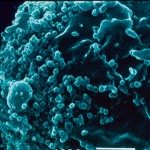Lien vers Pubmed [PMID] – 2119428
J. Reprod. Fertil. 1990 Jul;89(2):447-58
In this study, we examined the effect of injecting various cytokines. We report here that tumour necrosis factor (TNF)alpha, gamma-interferon and interleukin 2 (IL-2) can, in some circumstances, increase fetal resorption rates in abortion-prone (CBA/J x DBA/2) and non-abortion prone (CBA/J x BALB/c,C3H x DBA/2) matings: 1000 units TNF enhanced resorptions from 43 to 79% in CBA x DBA/2, from 7 to 89% in CBA x BALB/c, from 5 to 47% in C3H x DBA/2. The effect was both gestational age- and dose-dependent. Gamma interferon and R-IL-2 enhanced resorptions from 38 to 68% and 76% respectively in the CBA/J x DBA/2 mating combination, whereas the rates in CBA/J x BALB/c matings were enhanced from 6 to 44% and 55%. Lipopolysaccharide (LPS), which is known to lead to the release of TNF-alpha, had a similar effect, leading to gestational age- and dose-dependent enhancement of resorptions up to 100%. However, cytokines of the CSF family, including IL-3 and GM-CSF, increased the chances of fetal survival when injected into abortion-prone mice, e.g. reducing resorption rates in the abortion-prone CBA/J x DBA/2 mating combination from 55 to 22% (IL-3), and 47 to 8% (GM-CSF). They also increased fetal and placental weight and, in particular, expanded the spongiotrophoblast zone in the placenta. The latter observations may be due to a direct trophic influence on placental cells, perhaps through a cytokine cascade, or an indirect effect due to inhibition of natural killer (NK)-like cells, or both. Whatever the mechanism, these results may find practical application in influencing reproductive outcome in women and other species.

